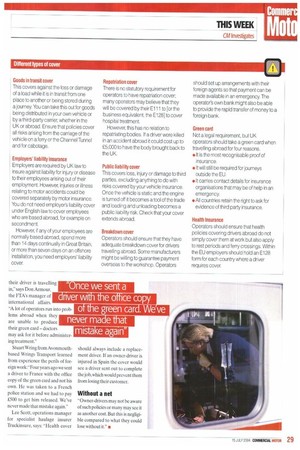Different types of cover
Page 29

If you've noticed an error in this article please click here to report it so we can fix it.
Goods in transit cover
This covers against the loss or damage of a load while it is in transit from one place to another or being stored during a journey. You can take this out for goods being distributed in your own vehicle or by a third-party carrier, whether in the UK or abroad. Ensure that policies cover all risks arising from the carriage of the vehicle on a ferry or the Channel Tunnel and for cabotage.
Employers' liability insurance
Employers are required by UK law to insure against liability for injury or disease to their employees arising out of their employment. However, injuries or illness relating to motor accidents could be covered separately by motor insurance. You do not need employer's liability cover under English law to cover employees who are based abroad, for example on secondment.
However, if any of your employees are normally based abroad, spend more than 14 days continually in Great Britain, or more than seven days on an offshore installation, you need employers' liability cover.
Repatriation cover
There is no statutory requirement for operators to have repatriation cover; many operators may believe that they will be covered by their E111 to [or the business equivalent, the E128] to cover hospital treatment.
However, this has no relation to repatriating bodies. If a driver were killed in an accident abroad it could cost up to £5,000 to have the body brought back to the UK.
Public liability cover
This covers loss, injury or damage to third parties, excluding anything to do with risks covered by your vehicle insurance. Once the vehicle is static and the engine is turned off it becomes a tool of the trade and loading and unloading becomes a public liability risk. Check that your cover extends abroad.
Breakdown cover
Operators should ensure that they have adequate breakdown cover for drivers travelling abroad. Some manufacturers might be willing to guarantee payment overseas to the workshop. Operators should set up arrangements with their foreign agents so that payment can be made available in an emergency. The operator's own bank might also be able to provide the rapid transfer of money to a foreign bank.
Green card
Not a legal requirement, but UK operators should take a green card when travelling abroad for four reasons.
• It is the most recognisable proof of insurance.
• It will still be required for journeys outside the EU.
• It carries contact details for insurance organisations that may be of help in an emergency.
• All countries retain the right to ask for evidence of third party insurance.
Health Insurance
Operators should ensure that health policies covering drivers abroad do not simply cover them at work but also apply to rest periods and ferry crossings. Within the EU employers should hold an E128 form for each country where a driver requires cover.






































































































































































































